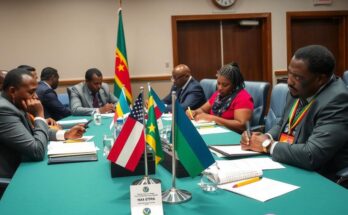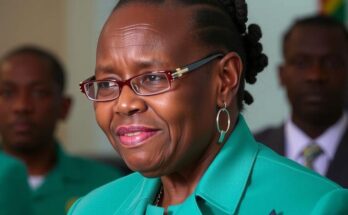Iceland is holding parliamentary elections after Prime Minister Bjarni Benediktsson’s coalition collapsed due to disputes over economic challenges and immigration issues. Voters will select 63 members of the Althingi from ten parties, amidst harsh weather conditions that could impede participation. This election is significant as it coincides with high inflation rates, increasing asylum seekers, and ongoing effects from volcanic eruptions that have further complicated housing and public response.
Iceland is conducting parliamentary elections following the collapse of Prime Minister Bjarni Benediktsson’s fragile coalition government, prompted by significant disputes concerning the economy, immigration, and the impacts of volcanic eruptions. The election represents Iceland’s sixth since the 2008 financial crisis, which triggered substantial economic turmoil and persistent political instability. The legislative assembly, known as the Althingi, will have voters choosing 63 representatives from among ten competing parties, with turnout historically high at around 80%.
On October 13, Prime Minister Benediktsson sought to dissolve the Althingi after struggling to maintain his coalition, comprised of the Independence Party, the centrist Progressive Party, and the Left-Green Movement. The recent harsh weather conditions threaten voter participation and may impede the delivery of ballot boxes. Moreover, Iceland faces significant challenges that include rising living costs, an influx of asylum seekers, and the aftermath of repeated volcanic eruptions that have complicated housing for many citizens, thereby intensifying dissatisfaction among the populace.
Inflation rates, which peaked at 10.2% in February 2023 due to post-pandemic economic pressures and geopolitical tensions, have recently eased but remain notably higher than in neighboring regions. The ongoing socio-economic strains, particularly instigated by natural disasters and increased immigration demands, have contributed to a fracturing political landscape, emphasizing the significant issues that voters must now confront as they head to the polls.
This election occurs during a period of political and social flux, where traditional party loyalties are being reexamined, and new political entities are emerging in response to public disenchantment. Voter engagement remains crucial as the nation seeks a stable path forward amidst ongoing economic difficulties and challenges arising from demographic changes.
The recent parliamentary elections in Iceland stem from a series of disputes over economic policy, immigration, and natural disasters, culminating in the collapse of a coalition government led by Prime Minister Bjarni Benediktsson. Since the 2008 financial crisis prompted widespread economic instability, Iceland’s political landscape has become increasingly fragmented, with multiple parties competing for representation. The context of the elections is heightened by rising living costs and ongoing challenges such as housing shortages and pressure from increasingly diverse asylum seeker populations, amplifying the urgency for effective governance and policy solutions.
In conclusion, Iceland’s upcoming parliamentary elections represent a critical juncture in the country’s political evolution. Faced with substantial economic challenges, heightened immigration concerns, and the lingering impacts of natural disasters, the electorate has the opportunity to reshape the future of governance in the nation. As ten parties vie for parliamentary seats amidst weather-related voting obstacles, the outcome of this election will be pivotal in determining how Iceland navigates its pressing economic and social issues.
Original Source: www.aljazeera.com




